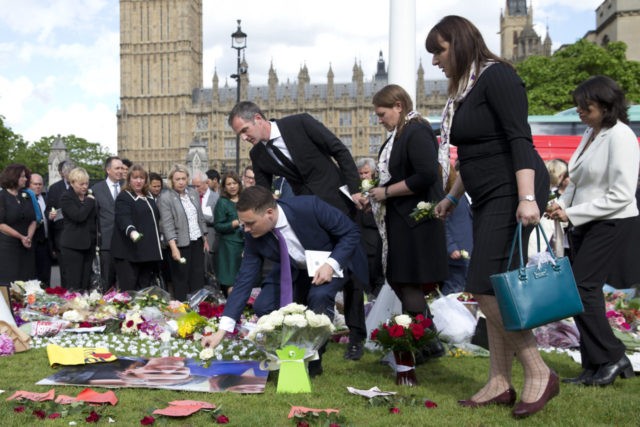Members of Parliament yesterday convened in the House of Commons to pay their tributes to Jo Cox, MP for Batley and Spen, who was killed last week. But their outpouring of grief lies in stark contrast to the protocol followed 25 years ago, the last time a sitting MP was killed, when democracy continued unabated.
The House of Commons was full to overflowing yesterday, with many MPs standing in the aisles as they lined up to pay tribute to their late colleague. Only one seat was vacant – the seat occupied until last week by Mrs Cox herself. In her place lay a white flower in remembrance.
The Prime Minister, David Cameron, who had given the order to have Parliament recalled for the event, used his speech to: “pay tribute to a loving, determined, passionate and progressive politician, who epitomised the best of humanity and who proved so often the power of politics to make our world a better place.”
He insisted that Ms Cox was a “committed democrat” and that “Jo’s politics were inspired by love”; and he called on his colleagues “and the generations of Members who follow us in this House honour Jo’s memory by proving that the democracy and freedoms that Jo stood for are indeed unbreakable, by continuing to stand up for our constituents, and by uniting against the hatred that killed her, today and forever more.”
And he announced that this coming Wednesday, which would have been Mrs Cox’s birthday, “there will be a global celebration of her life and values with simultaneous events in New York and Washington, London, Batley, Brussels, Geneva, Nairobi and Beirut.”
This Wednesday also marks the last day of campaigning for the referendum on British membership of the European Union – a referendum for which some of the members sitting in the Commons yesterday have been striving for decades, and which will set the scope of British democracy for decades yet to come.
As such, far from pausing the campaigning for a “celebration of her life,” many have suggested that the highest form of tribute to Mrs Cox must surely be the continuation of the hotly contested campaign.
On this matter, Mr Cameron may wish to take a leaf out of the book of his esteemed predecessor, Margaret Thatcher, the last Prime Minister to be forced to deal with the untimely death of a Parliamentary colleague (and in her case, a dear friend.)
On the 30th July 1990 Ian Gow, the Conservative MP for Eastbourne, was murdered when a bomb placed under his car by the Provisional IRA was detonated. He took ten minutes to die from his injuries in front of his wife.
By all accounts Mr Gow was also a committed democrat. In an article marking 25 years since his death published last year, the Conservative Party’s historian Lord Alistair Lexden described Mr Gow as witty, charming, and dedicated to the Ulster cause for which he had resigned a ministerial post five years before his death. As with Mrs Cox, tributes flooded in from colleagues on both sides of the house following his murder.
Incidentally Lord Lexden also notes that Gow “refused any form of special personal protection. A few weeks before his death, when pressed to vary his journeys and check under his car, he replied characteristically “Certainly not. I am at less risk than any serving officer in Her Majesty’s Royal Ulster Constabulary—and anyway, I wouldn’t know what to look for”.”
But unlike Mr Cameron, Mrs Thatcher did not recall Parliament to the Commons to pay tribute to Mr Gow. Instead she insisted that life – and democracy – must go on. In the by-election that followed democracy did indeed go on; the seat was contested by all parties and actually fell to the Liberal Democrats during what was a difficult period for the Conservatives, coinciding with unrest over the poll tax.
It had been the same six years earlier, in October 1984, when a bomb, again planted by the IRA, tore through Brighton’s Grand Hotel killing five people including an MP, Sir Anthony Berry, and wounding 31 others during Conservative Party conference. At 4am Mrs Thatcher left the police station to which she had been driven after the blast and immediately announced that the conference would go on as planned. The local branch of Marks and Spencer was requested to open an hour early so that people could replace clothes lost in the blast.
In her speech to conference the next day she told the party and the wider world that the bomb had been “an attempt to cripple Her Majesty’s democratically elected Government.
“That is the scale of the outrage in which we have all shared, and the fact that we are gathered here now—shocked, but composed and determined—is a sign not only that this attack has failed, but that all attempts to destroy democracy by terrorism will fail.”
It is that tradition of defence of democracy that senior Conservatives have therefore criticised Mr Cameron’s decision not to run a candidate in the Batley and Spen by-election which will now have to take place; a decision which has been met in kind by the leaders of the Liberal Democrats, the Green Party and the UK Independence Party, effectively leaving Labour to merely nominate a replacement for Mrs Cox.
Some have pointed out that, under the protocols of representative democracy, the Batley and Spen seat was Jo Cox’s for as long as she held it, not the Labour Party’s to control at whim. Another senior Conservative who wished to remain anonymous has simply said: “I can see the argument either way, but can’t help thinking that the answer to an assault on democracy is more democracy.”

COMMENTS
Please let us know if you're having issues with commenting.